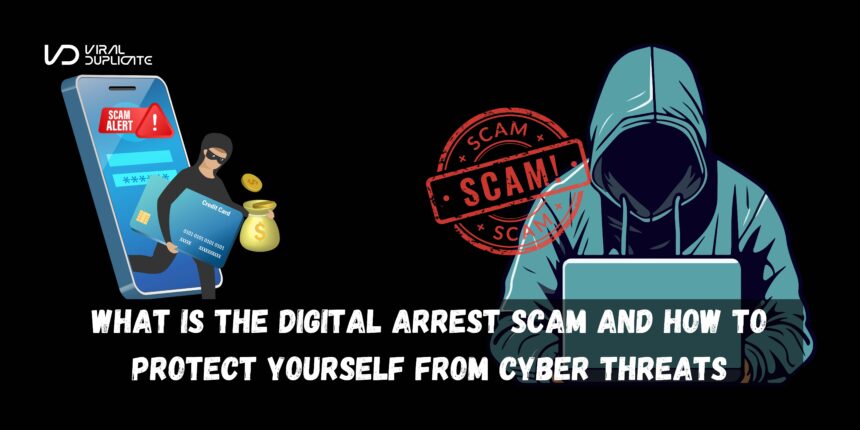Scammers are getting smarter day by day as everything is moving towards digitization in our world. Digital Arrest Scam is one of the latest and most dangerous threats entering the world of digital crimes. This online scam main mission is to make people suffer by manipulating their fears and the sense of urgency.
The victims are tricked into thinking they are arrested and they need to pay a fine or share their personal data in order to avoid arrest. More then 92000 Indians are affected this year. This post will tell you clearly what isDigital Arrest Scam How to Protect Yourself.
What is the Digital Arrest Scam?

The Digital Arrest Scam is a cybercrime pattern of scammers disguised as police officers or government officials. Very often, they will say that the victim is facing charges of a criminal nature for such things as tax evasion or illegal online activity. The crooks would say that the arrest will take place at any moment unless the victim agrees to pay the fine or hands out the personal information like the bank account numbers or Social Security details.
Usually, this scam involves phone calls, emails, or text messages. The fraudster creates a situation where they lead the victim to believe they are at risk through the use of fear and urgency, which makes the victim feel compelled to accede to the demands, for example, asking them to make payments via untraceable methods such as gift cards or wire transfers.
How Does the Digital Arrest Scam Work?
Learn the operational mechanisms of this digital scam so that you will be able to categorize any threat attack. Consider the following steps when scammers commit the Digital Arrest Scam:
- Initial Contact: The fraudster first engages with an email, text, or phone call coming from someone who claims to be a government official or law enforcement officer. The call or email address may be phony but it appears real to the victim thanks to some tools.
- Threat of Arrest: The criminal will inform the victim that they’ve been connected to criminal activity, like tax fraud or online illegal behavior. They will notify the person in question that a digital arrest warrant has been issued.
- Demand for Payment: The fraudster will then request the immediate payment to avoid the arrest. This may be a fine or a “processing fee,” in which case the scammer often asks for payment in non-traceable means such as gift cards or wire transfers.
- Impersonating Authority: In order to make it look more reasonable, the scammer might even use fake documents, or refer real laws and regulations. Commonly, they would narcissistically threaten to inflict heavy repercussions, which in turn would make the situation more tense.
- Sense of Urgency: Scammers will put the victim in a microwave, asking for a hasty reaction, and often claiming that their arrest is around the corner unless they act promptly. The sense of urgency arises because the victim does not have time to check the authenticity of the claim.
How to Protect Yourself from the Digital Arrest Scam
Now that you have learned how the scam happens, here’s the way to save yourself from the Digital Arrest Scam:
1. Recognize Red Flags in Communication
One of the main means of defense against online scamming is, of course, knowing the basic red flags. Do not be misled if:
- Out of the blue a telephone call or email from a government agency or law enforcement is received.
- The message asks for strong action or payment right away.
- The sender inspires you to use untraceable tools like gift cards and bank transfers to make a payment.
- The communication is intimidating or shows a high level of urgency.
2. Verify the Source
Should you happen to get a message that accuses you of being in debt or of being arrested be sure to check whether or not the source is reliable before you proceed:
- Simply get in touch with the agency through their official website or telephone number.
- Never use the information given in the message itself, as it may be a scam.
- Find out if there are any such warnings posted by your local law enforcement or government website.
3. Don’t Share Personal Information
Real organizations would not ask you for sensitive information, such as your Social Security number or bank account details, over the phone or email. Only disclose personal information when you are sure the request is valid.
Read more about The Future of Cryptocurrency and Blockchain in 2024: Trends, Challenges, and Innovations
4. Use Strong Online Security
Protect yourself from all kinds of digital scams by having a robust cybersecurity system in place:
- Use strong, unique passwords for all accounts.
- Where possible, enable two-factor authentication (2FA).
- Install reputable antivirus software on your devices.
- Update your software regularly to protect against vulnerabilities.
5. Report the Scam
If you have the suspicion that you’ve been targeted by a Digital Arrest Scam, report it immediately. In the USA, you can do this by filing a complaint to the Federal Trade Commission (FTC) or the FBI’s Internet Crime Complaint Center (IC3). In other countries, the victims should report the scam to local law enforcement or consumer protection agencies.
6. Educate Yourself and Others
Stay informed about common cyber threats and online scams. If you are well-informed, you will be less likely to fall prey to these scams. Spread the word to your family and friends and let them know that they can also stay safe from becoming victims.
Stay Safe in the Digital Age
As cybercriminals become more sophisticated, it is of utmost importance to remain vigilant against digital scams such as the Digital Arrest Scam. Identify the red flags, verify the claims, and good security practices, will be the ways in which you protect yourself from being a victim.
Just keep in mind that you will never receive a phone call from any legitimate law enforcement department to pay the amount or else they would arrest you. Be on the lookout, keep yourself updated, and control your data. Through these acts of vigilance you will be able to keep away from the many new dimensions that the online scams are taking and the cyber threats that are becoming more prominent.








